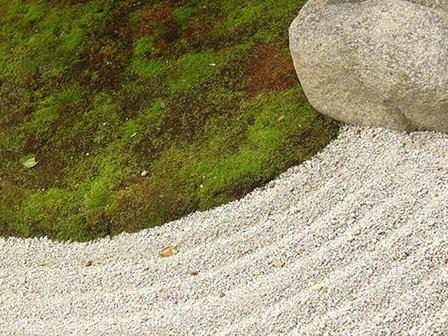How is a spiritual person supposed to act? Should s/he be more gentle? Speak in a soft voice? Work as a holistic healer? Have only ‘mindful' sex, not drink, not get angry? Maybe give lots of money to charity?
I want to claim that these misconceptions confuse what spirituality is and isn't, are exceedingly class- and culturally dependent, and get in the way of making progress (yes, it exists) on the spiritual path. They're also pretty annoying.
"Spirituality" is a vague term, but here's what I mean by it. I use it to refer to intentional (i.e. directed, conscious) practices that work on the mind/body to change the perspective on the self and selfishness, and lead to less suffering for oneself and others. The same thing may be spiritual or not spiritual: you can eat to grab a meal, or eat to cultivate gratitude. Both are fine, but only the latter is "spiritual" in the sense I mean here. Of course, others may have different definitions, and that's fine.
Spirituality can have many different trajectories. Some forms of spirituality cultivate love, others cultivate wisdom. Some involve deities, chanting, and devotion, while others are entirely atheistic, even mechanistic. Personally, my primary path has been Theravadan Buddhist meditation (which I am formally authorized to teach) coupled with a Jewish devotional/communal path, and seasoned with many other ingredients. But that's just me. The point is that spiritual practice can lead in different directions. Go to law school, and you learn about law. Go to med school and you learn something else. Likewise, while there are commonalities, you learn different things on the yoga mat, in the zendo, in the medrasa, and in the woods. Even if you want to believe that these are all different faces of the same Thing, the faces move us in different directions and emphasize different aspects of the phenomenal world.
So, some forms of spirituality will indeed curb your drinking and your sex life, or at least demand that you do so. Others, though, don't. To think that all forms of spiritual practice lead to one kind of destination is factually incorrect.
Making progress on the Buddhist path, for example, loosens the identification with the ego, and leads to intuitive understanding of the impermanence, ultimate unsatisfactoriness, and emptiness of all things. In my experience, it leads to a ground of happiness that does not come and go — the word "intuitive" in the previous sentence is the crucial one, and also points to how long it takes for such knowledge to arise. But it doesn't lead to the knowledge of how to change the oil in my car, and it doesn't lead to sympathy with crystal healing, patchouli, or hempseed vests.
It hasn't even led me to be more socially skillful. I was, and remain, somewhere on the autism scale when it comes to predicting how other people perceive me. I'm an introvert, and I neither understand nor particularly like complicated interpersonal interactions. My various dharma accomplishments have not changed this. On the contrary — they've made the behaviors worse. Because I don't get as bothered by a bit of negative energy here or there, I have grown even more oblivious to how deeply others are upset by it. Okay, somebody's having a meltdown. It'll be okay eventually; why does someone else now want to process it with me?
In other words, in many ways, I'm an even bigger jerk now than I was before I did my long meditation retreats.
So too with highly advanced spiritual practitioners who have sex with their students, or are endlessly self-promoting, or are otherwise offensive and problematic. As Ken Wilber — whose organization has sheltered several such dysfunctional people — has pointed out, ethical lines of development are distinct from spiritual/trans-personal ones. They may be related, and we may point to ethical failings as evidence of spiritual flaws, but they are not identical. Spirituality — at least some kinds of spirituality — just doesn't do that work. For that, you need a therapist, or hard lessons, or drugs.
Nor does spiritual practice necessarily lead to a less sexual, less active mundane life. Again, it may — but it doesn't have to. Personally, as someone who spent a decade of my adult life repressing my sexuality, I have no interest in doing so now. I like food, sex, and good movies, good scotch, and good books. None of these compare to the bliss states I cultivated on a jhana retreat, but they're not bad.
And not every spiritual adept comes back to train more adepts. Because of my severe social limitations, I teach contemplative practice only sparingly. I've also worked as a writer, nonprofit director, and law professor. I've been politically active, and gone to expensive fundraisers in a suit. I won't say that these more earthly pursuits feel deeply nourishing to me in the way that meditation retreats do, but it's part of the worldly package, and I do them.
These misconceptions about what a spiritual life should look like doubtless alienate many cynics and skeptics from taking spirituality seriously. Oh, let's leave that for the soft-minded New Age people, they say. Whereas I see them as the spiritual equivalents of a 98-pound weakling. Such good taste in indie pop, but so infantile spiritually. Then again, who can blame them? With only a few exceptions (Noah Levine of 'Dharma Punx' comes to mind, as does Patrick Aleph of 'Punk Torah'), most of our spiritual heroes are either Eastern sages or Western Baby Boomers. These are people to whom most people my age (40) and under cannot relate on a personal level. If being a good meditator means being a 60 year old psychoanalyst who lives on West End Avenue, most of my friends aren't interested.
Not that there's anything wrong with that.
Finally, spiritual misconceptions can obstruct spiritual progress. First, yes, Virginia, there is such a thing as spiritual progress. Like anything else, as you practice, you get better at it — and not just in terms of brute skills, but in terms of observable changes to the mind, and maybe even the brain. In my experience, that progress is a lot like making progress at the gym. If you do the work, it happens at its own pace. You can't rush it, but you needn't supervise it either. From what I understand, meditation increases the neural activity in the pre-frontal cortex, leading to more connections and more "strength" for that self-regulating part of the brain. That results from doing the work, not hoping for certain results.
As a result, you may be doing just fine, even if you don't (yet) feel different, and even if you haven't bought any Yanni CDs. "What's wrong?" you might ask, "I'm doing all this work, but I still get pissed off at my mom!" Well, sure, welcome to being human. Maybe, over time, you'll notice that your anger lasts for less time, that you're less immediately reactive, that you pick fewer fights (or take the bait less often). But that may be all you can hope for. Meanwhile, the practice is doing its work, if you just stay with it in some form or another.
For what I'll call karmic reasons, I'm sincerely appreciative of the many delights in the world, and as Lou Reed said, "for me to miss one, would seem to be groundless." I'm also mindful that spirituality that doesn't include some form of serious social/political engagement is, at least for me, empty. So I get involved in things that will necessarily invite some anger (politics) and lust (food and sex), even though these are problematic on several spiritual paths, including my own. This karma — by which I mean the social constructions of my particular Western subculture, which seem as much a part of 'me' as anything — may well be holding me back from further advancement. But it's the karma that there is. And each time I re-ask whether it wouldn't be better to give up the fleshpots for the cloister, I hear a clear, humanistic No in response.
Let's set ourselves free of this idolatry of the spiritual life. The spiritual path has far too many manifestations for us to be reductive about it, and far too many directions for us to subsume them all into one. Just setting these clichés aside may be a significant step toward freedom.
Image by EverJean, courtesy of Creative Commons license.











